Real estate brokers play a crucial role in facilitating the process of buying and selling homes. They have a vital responsibility in upholding and ensuring compliance with all fair housing laws throughout the transaction. Unfortunately, there may be times when a real estate broker accidentally violates these laws, often without realizing it. Knowing how to distinguish between intentional and accidental violations is essential for buyers and sellers affected by such actions.
In this article, we will explore steps to take if you suspect your real estate broker has inadvertently made a mistake regarding fair housing laws. You can help ensure an appropriate and compliant real estate transaction by promptly addressing concerns and seeking clarification. Let’s dive in!
Definition of Fair Housing Laws
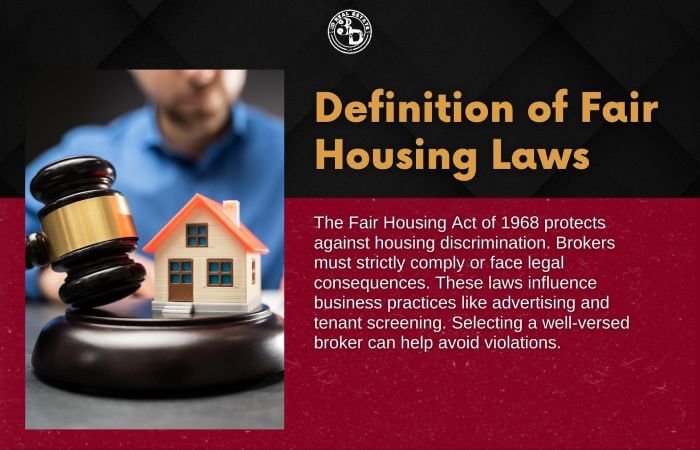
Fair housing regulations protect individuals from discrimination in the sale and rental of housing. These anti-discrimination laws stem from the 1968 Fair Housing Act, an amendment to the Civil Rights Act of 1964. These fair housing protections ensure equal access to everyone regardless of race, color, religion, national origin, sex, disability, or familial status.
Strict adherence to state and federal laws is crucial when dealing with real estate brokers and agents. Any deviation could constitute ethical violations and lead to legal consequences. It includes following rules against discriminatory practices based on protected characteristics like gender or race.
In addition to following local fair housing laws, brokers should also understand how these regulations affect other parts of their business operations—from advertising practices to tenant screening processes. Taking steps now will help prevent future issues for real estate professionals who accidentally violate fair housing regulations. To avoid this issue altogether, though, there are certain things one can look for when selecting a broker.
What to Look For in a Broker
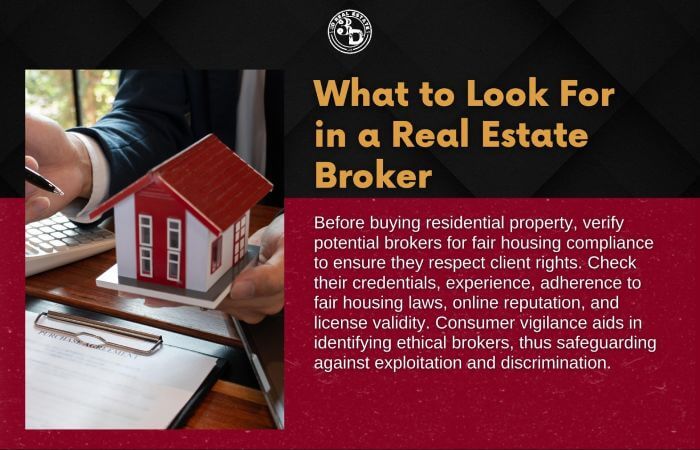
When considering residential property purchases, you need to look out for a real estate broker. Before engaging in any broker’s services, a thorough investigation into allegations of fair housing violations should be conducted. Consumers can expect brokers to respect their rights under fair housing laws. They need to take steps to protect themselves against potential civil action.
When looking for a real estate broker, consumers should ensure they inquire about the qualifications and experience of the individual or firm they intend to engage with. Additionally, they must ensure no red flags indicate violations of fair housing laws. Researching online reviews can provide insight into how other customers perceive the quality of service an agent provides. It is also essential to verify that the broker has obtained a real estate license in the right way, as this ensures they have met the requirements to practice legally.
Overall, due diligence on behalf of consumers can help identify legitimate real estate brokers who adhere to ethical standards and comply with all applicable fair housing regulations. However, when searching for a broker who meets these criteria, consumers must remain diligent in their research to avoid being taken advantage of or suffering unfair discrimination.
Red Flags Indicating Violations
Recognizing these warning signs is crucial to preventing discrimination and ensuring state and federal laws compliance. Here is a summary of the red flags that may indicate fair housing violations by a real estate broker:
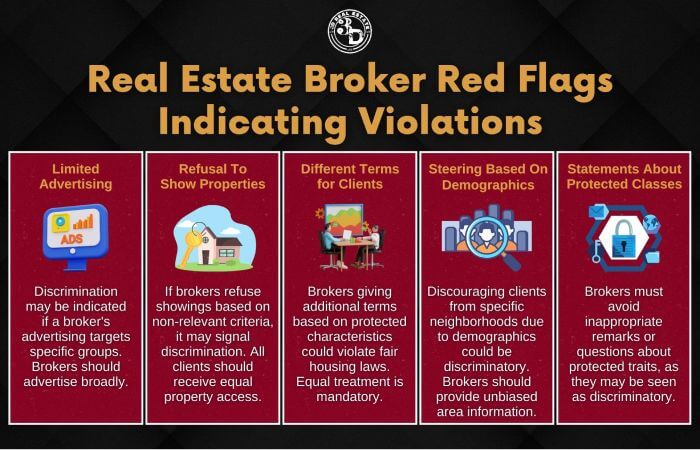
- Limited advertising
If a broker only advertises their services through specific media outlets that target particular groups, it could indicate discriminatory practices. Instead, brokers should strive for broad advertising to reach diverse potential clients.
- Refusal to show properties based on unrelated criteria
It may be discriminatory if a broker refuses to show properties to individuals based on criteria unrelated to their qualifications, such as their race, religion, or national origin. Brokers should treat all potential clients equally and provide equal access to property showings.
- Different terms for clients from various backgrounds
A broker setting additional client terms and conditions based on their environment or protected characteristics could violate fair housing laws. All clients should receive fair and equal treatment, irrespective of their race, ethnicity, religion, gender, national origin, or disability.
- Steering based on demographics
It may be discriminatory if a broker discourages potential buyers from specific neighborhoods because of their demographics. Therefore, brokers should not influence clients’ decisions based on protected characteristics but should provide unbiased information about different areas.
- Statements or questions about protected classes
Brokers should avoid making statements or asking inappropriate questions about race, color, religion, sex, national origin, or disability. Such actions could be considered discriminatory and prohibited under fair housing laws.
By recognizing these red flags and being vigilant about potential violations, individuals can protect their rights and report any suspected discriminatory practices to the appropriate authorities.
Investigating Potential Violations

Investigating potential violations of fair housing laws by real estate brokers is essential. To do so, consumers must be aware of their rights and the possible abuses that can occur. One way to identify a violation is by evaluating questionable practices, such as failure to return calls or emails from certain groups, treating some customers differently, or refusing to show homes in specific neighborhoods.
Additionally, reviewing public records for complaints against the broker may reveal prior violations. Consumers should also research licensing requirements for real estate brokers and ensure those requirements are met. It may also be beneficial to consult with a consumer protection attorney regarding any allegations of discrimination experienced while buying or renting property.
Finally, if there is reason to believe that a real estate broker who accidentally violates fair housing laws has committed wrongful discrimination, it is worth considering civil action. In such cases, consulting with a qualified lawyer is essential to determine the best course of action to pursue this outcome, if necessary.
Civil Action for Wrongful Discrimination
If a real estate broker has violated fair housing laws, they may face civil action for wrongful discrimination. It can include monetary damages and injunctive relief, such as policies or training to ensure the violation doesn’t occur again.
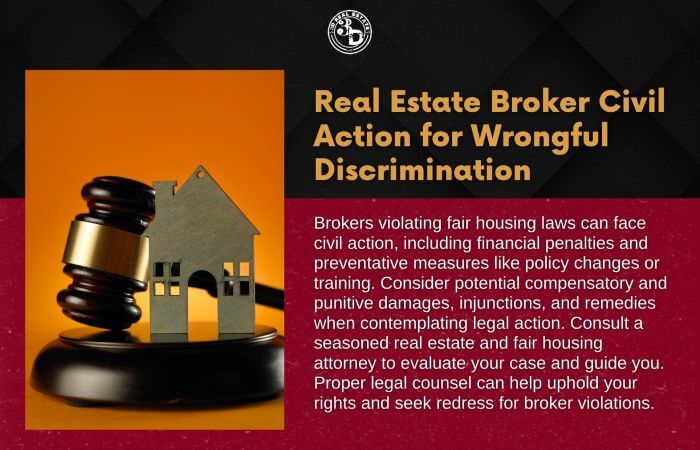
When considering whether to take legal action against a real estate broker who has violated fair housing laws, it is important to consider the following:
- Potential Monetary Damages
- Compensatory damages
- Punitive damages
- Injunctions & Remedies
- Policy changes
- Training programs
It is also critical to consult with an experienced attorney specializing in real estate and fair housing law before initiating civil action against a real estate broker. An attorney will be able to evaluate your case and suggest how best to proceed. With the proper counsel, you can protect your rights as a consumer and seek justice for any violations by a real estate broker.
Protecting Your Rights as a Consumer
Consumers need to understand their rights when dealing with a real estate broker. Violating fair housing laws can lead to civil action and serious consequences, so both parties must be aware of the applicable rules and regulations.
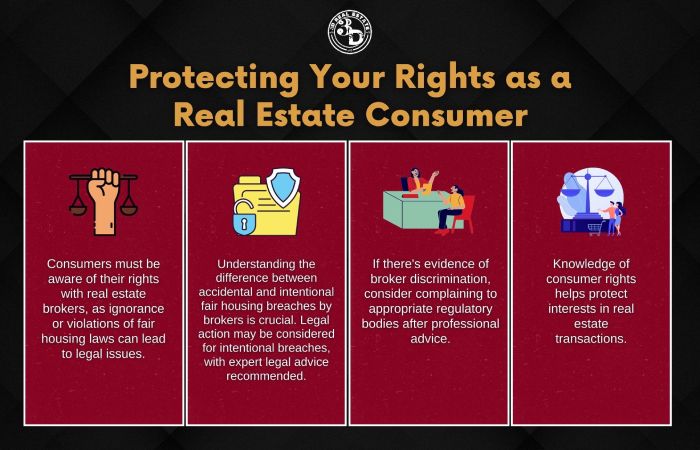
To protect your rights as a consumer, it is crucial to differentiate between a real estate broker who accidentally violates fair housing laws and one who intentionally or recklessly does so. Suppose you suspect a real estate broker has deliberately violated fair housing laws. In such instances, it is possible to pursue legal measures against them. Consulting with an experienced attorney is recommended to assess whether such action is appropriate for your circumstances.
In some cases, it is also advisable for you to file a complaint with the relevant government agency or other regulatory body if you have evidence that the broker has engaged in wrongful discrimination. It is highly suggested to consult with a qualified professional before acting in these circumstances. Understanding your consumer rights and how they apply in this context will help protect your interests during any dealings with a real estate broker.
The Bottom Line
It’s essential to understand your rights under fair housing laws and be aware of potential violations by brokers. To ensure you don’t become the victim of wrongful discrimination or other illegal practices, conduct thorough research when selecting a broker and investigate any red flags you may encounter. If you suspect a broker is engaging in behavior prohibited by fair housing laws, take immediate action to protect yourself. It includes filing a complaint with local authorities or initiating civil action for damages due to unfair treatment.
At 3D Real Estate, we are committed to upholding fair housing laws and ensuring that all individuals are treated with dignity, respect, and equality in their pursuit of a home. Contact us now to learn more about our dedication to fair housing and how we can assist you with your real estate needs.




